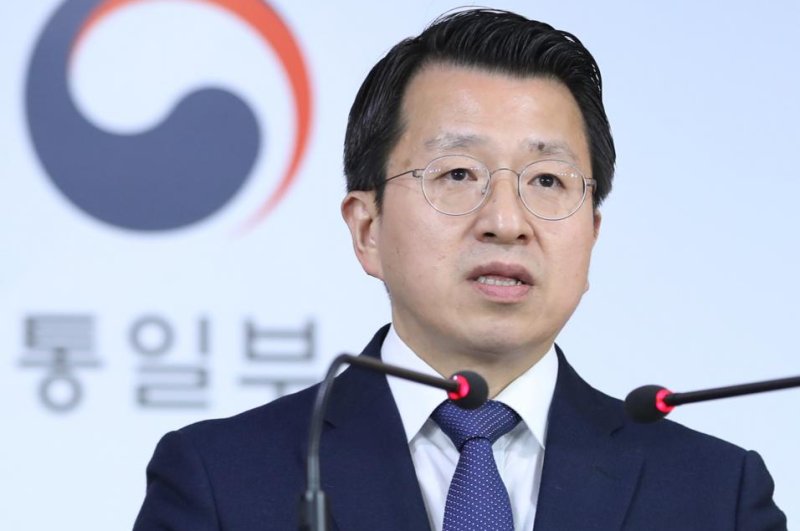Baik Tae-hyun, spokesman for the unification ministry, said Monday North Korea restored some personnel to an inter-Korean liaison office in the border city of Kaesong. Photo by Yonhap
SEOUL, March 25 (UPI) -- North Korea restored some personnel to an inter-Korean liaison office in its border city of Kaesong on Monday, a unification ministry official said, just three days after the regime withdrew all its staff from there.
Four or five North Korean officials returned to the office earlier in the day and held a meeting with their South Korean counterparts, according to the ministry official.
"The North Koreans said that they came down [to the liaison office] to take their shift as usual," the official told reporters on condition of anonymity. "Accordingly, the representatives of liaison officers [of the two Koreas] held a meeting in the morning and plan to operate [the office] as usual."
"They said that the North's commitment remains unchanged for the liaison office to carry out projects in line with the North-South joint declarations," he said, apparently referring to the agreements that their leaders reached in their three summits last year.
He still cautioned that it remains to be seen whether the operation of the liaison office has fully returned to normal as the number of North Korea officials sent there is just half of the ordinary level.
On Friday, North Korea abruptly pulled its staff from the liaison office, saying that the decision was based on an order from "higher-ups." It did not provide clear reasons for the withdrawal.
Experts and analysts said the pullout appears to be designed to pressure Seoul to do more to persuade the United States to lower its demands in the stalled denuclearization negotiations.
The return of North Korean liaison staff came after U.S. President Donald Trump tweeted that he ordered the withdrawal of new sanctions on Pyongyang, possibly signaling an intention to continue denuclearization negotiations with the regime.
"I think they did this [withdrawal] as an expression of discontent over the stalled negotiations with the United States, but since Trump withdrew the sanctions, the North is also responding to the decision, sending a message to the U.S.," Lim Eul-chul, a professor at the Institute for Far East Studies at Kyungnam University, said.
The two Koreas opened the office in September last year to foster their cross-border exchanges and reduce tensions by keeping a communications channel open at all times. It was a follow-up to an agreement their leaders reached in April.
They agreed to hold a weekly meeting between the office's co-heads to discuss pending issues, but since the breakdown of last month's summit between North Korean leader Kim Jong Un and Trump, no such meetings have been held, though Seoul has insisted that there were no problems in communication with the North.
Kim and Trump met in late February in Hanoi, Vietnam, for their second summit but failed to strike a deal as they were at odds over how to match Pyongyang's denuclearization steps with concessions from Washington, including sanctions relief.
Friday's staff pullout came a week after North Korean Vice Foreign Minister Choe Son-hui threatened to abandon the nuclear negotiations, accusing Washington of making "gangster-like" demands. She said leader Kim would decide soon whether to pursue talks and maintain his moratorium on nuclear and missile tests.
Trump's signaling of a willingness to negotiate appears to have played a role in North Korea's decision to return some staff to the liaison office. Trump tweeted Friday that he canceled unspecified "additional large scale sanctions" that the Treasury Department was preparing to announce.
Earlier Monday, South Korea sent its officials to the liaison office, hoping to normalize the communication line as soon as possible and keep pushing for planned projects with North Korea, such as video reunions of families separated by the 1950-53 Korean War.
Seoul recently received relevant sanctions exemptions on the reunions from the United States and the U.N. Security Council and set aside a necessary budget.
The unification ministry official said that the government will raise the issue with North Korea through the liaison office as soon as its internal discussion is complete.















